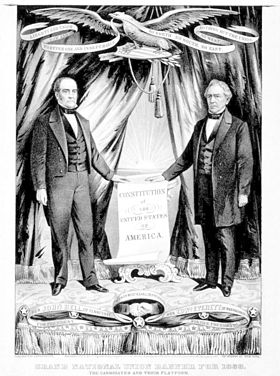- Constitutional Union Party (United States)
-
Not to be confused with Constitution Party (United States).
Constitutional Union Party Founded 1859 Dissolved 1860 Preceded by Whig Party (part), Know-Nothing Party or American Party Succeeded by National Union Party Ideology American nationalism, gag rule Political position Centrism Official colors Orange Politics of United States
Political parties
ElectionsA Constitutional Union campaign poster for the 1860 election. Shown are John Bell (left), the presidential nominee, and Edward Everett, the vice presidential nominee.
The Constitutional Union Party (also known as the Bell-Everett Party in California) was a political party in the United States created in 1860. It was made up of conservative former Whigs who wanted to avoid disunion over the slavery issue. These former Whigs (some of whom had been under the banner of the Opposition Party in 1854-58) teamed up with former Know-Nothings and a few Southern Democrats who were against disunion to form the Constitutional Union Party. Its name comes from its extremely simple platform, a simple resolution "to recognize no political principle other than the Constitution...the Union...and the Enforcement of the Laws." They hoped that by failing to take a firm stand either for or against slavery or its expansion, the issue could be pushed aside.
Contents
Beginnings
The Constitutional Union Party united Whigs and Know-Nothings who were unwilling to join Democrats or the Republicans. Senator John J. Crittenden of Kentucky, Henry Clay's successor in border-state Whiggery, set up a meeting among fifty conservative, pro-compromise congressmen in December 1859, which led to a convention in Baltimore the week of May 9, 1860, one week before the Republican Party convention.
1860 presidential election
The convention nominated John Bell of Tennessee for President and Edward Everett of Massachusetts for Vice President.
In the 1860 election, the Constitutional Unionists received the great majority of their votes from former southern Whigs or Know-Nothings. A few of their votes were cast by former Democrats who were against secession. Although the party did not get 50% of the popular vote in any state, they won the electoral votes of three states, Virginia, Kentucky, and Tennessee, largely due to the split in Democratic votes between Stephen A. Douglas in the North and John C. Breckinridge in the South. California and Everett's home state of Massachusetts were the only non-slave states in which the party received more than 5% of the popular vote.
After 1860
The party and its purpose disappeared after 1860 as the southern states began to secede. Bell and many other Constitutional Unionists later supported the Confederacy during the Civil War, but backers of the party from north of the Carolinas tended to remain supporters of the Union. Constitutional Unionists were influential in the Wheeling Convention, which led to the creation of the Union loyalist state of West Virginia, as well as in the declaration of the Kentucky State Legislature for the Union and winning Congressional elections in Kentucky and Maryland in June. In Missouri, many of the party joined the new Unconditional Union Party headed by Francis P. Blair, Jr. and remained active in that state's efforts to remain in the Union by overthrowing the elected government of Claiborne Jackson.
See also
External links
Categories:- Political parties established in 1860
- Defunct political parties in the United States
- American Civil War political groups
- Conservative parties in the United States
- Centrist political advocacy groups in the United States
Wikimedia Foundation. 2010.

